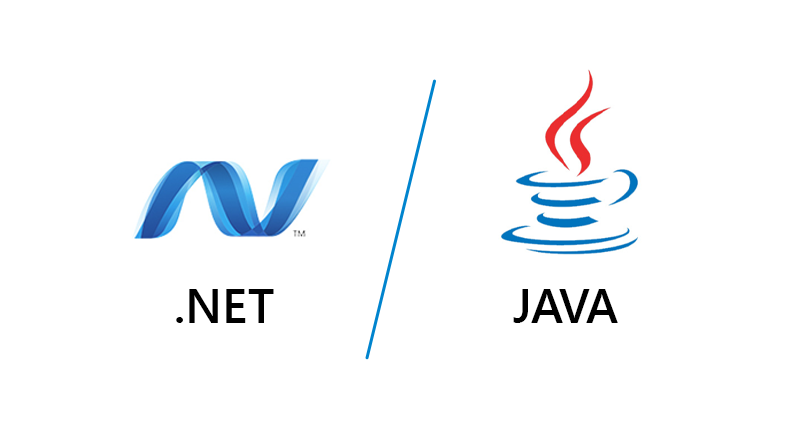TECHNOLOGY
.NET vs. Java

.NET vs. Java
There has been a heated battle between Java developers and .NET developers regarding which platform is better for web development, software development, and other such use cases.
Both .NET and Java are very popular, robust, versatile, and worthy platforms that can be used for building a range of solutions. This blog aims to provide a complete analytic comparison of .NET and Java, analyzing their strengths, weaknesses, ecosystems, community activeness, performance, security, and other important factors.
What is .NET?
.NET is a software development framework designed by Microsoft. It offers a wide range of libraries & tools for building desktop applications, web applications, and applications for other platforms. It supports languages like Visual Basic, C#, and F#. .NET is popularly known for its integration capabilities with Windows OS. Microsoft also introduced .NET Core to enhance cross-platform compatibility.
What is Java?
Java is one of the oldest yet most robust and relevant programming languages developed by Sun Microsystems but is currently owned by Oracle. It is an object-oriented programming language that makes use of the ‘write once, run anywhere’ concept. This means you can write the code once and run it on any device that supports JVM – Java Virtual Machine. Java is designed for portability, so it is often seen as a popular choice for enterprise-grade app development, Android mobile apps, and web applications.
.NET vs. Java Use Cases

Let’s start by figuring out when it is better to hire .NET developers and when it is better to hire Java developers for your project –
When to Use Java Over .NET
-
Java’s WORA with JVM and JIT makes it the perfect choice when you need cross-platform compatibility and target multiple operating systems.
-
If you want to build an enterprise app with complex architecture with scalability, security, and other NET.
-
If you opt for popular Java frameworks such as Spring and JSF,
-
Java can also be used for web development. These frameworks are designed to build scalable, secure, robust, and user-friendly web applications.
-
If you plan on developing mobile applications, especially for the Android ecosystem, Java is the official language for Android Studio. It has all the right tools and libraries to power your Android app efficiently.
When to Use .NET Over Java?
-
When you are 100 percent sure to commit to the Windows ecosystem and need tight integration with Microsoft platforms like Azure, Active Directory, and more.
-
If you prefer C# language, .NET provides seamless support for it. Coding in C# results in a more maintainable, readable, and clean code structure, making it a preferred choice for many developers.
-
If you want to build desktop apps for the Windows platform, .NET has Windows Presentation Foundation, Windows Forms, and other tools, which help you create seamless user interfaces and allow integration with other Windows features.
-
If you have a gaming app project that you want to integrate with DirectX for graphic rendering, .NET has better support through gaming libraries like SharpDX that can help you level up your game graphics significantly.
.NET vs. Java – Performance and Execution Speed
.NET applications work greatly on the Windows platform since it is designed to be compatible with the Windows OS. .NET desktop applications can utilize optimizations provided by Windows which helps improve its memory management and execution significantly. However, when you take .NET applications out of their comfort environment outside Windows, the performance and execution speed take a notable hit especially compared to Java.
Java applications can run efficiently on practically all platforms that support Java Virtual Machine. It also has other impressive features like the Just-In-Time (JIT) compiler that optimizes runtime code, improving the execution speed after the first warming-up round. Java has impressive numbers when it comes to performance on server-side applications as well as benchmarks on most comparison charts and surveys.
.NET vs. Java Platform Independence
Platform independence can be an important dealbreaker or USP over the other platform when it comes to choosing between .NET and Java. .NET Core did help the .NET platform to introduce cross-platform compatibility of .NET applications to run on macOS and LinuxOS. This has greatly improved the versatility and reach of the .NET framework enabling .NET developers to target major platforms without major codebase modifications. However, compared to Java, .NET is still platform-dependent and not truly platform agnostic.
Java thrives and prides itself on its platform independence. It enables applications to run on different platforms using JVM. This makes Java an ideal choice for projects that need seamless functionality and accessibility across various devices and platforms. Writing the application code once and deploying them to other platforms with minor code modifications saves both – development time and costs while maintaining a singular codebase.
.NET vs. Java Integration with Existing Systems
If you will work with Windows and need seamless integration with Microsoft services, .NET is an unquestionable clear choice. It integrates smoothly with Microsoft products like Azure cloud services, Active Directory, and SQL Server Databases.
On the other hand, if you work with various platforms or plan to include them in your workforce later, platform-agnostic Java is the best choice. You can build cross-platform enterprise-grade apps using Java while interacting with various databases, APIs, and web services irrespective of what tech stack you use, giving developers complete freedom of the tech stack they want to use.
.NET vs. Java Security Measures
.NET seamless integration with Windows provides access to various security features and protections. Microsoft as an ecosystem focuses heavily on security and provides regular and frequent patch updates to improve overall platform security. .NET community also is very active in identifying and resolving common security issues.
Java has a robust security model with a sandbox environment that prevents unauthorized access to untrusted code toward system resources. With regular updates and continuous improvements, Java is considered one of the most secure platforms.
.NET vs. Java Community Support and Popularity
The .NET community has gained numbers in terms of active developers, contributors, testers, and other important members in recent years. It has strong support from Microsoft, which contributed majorly to its popularity. Also, the introduction to .NET Core attracted more developers to try the library. There are many official forums, blogs, Git repositories, and documentation that serve as a knowledge base for the community. However, it still needs to be more widespread than Java.
The Java developer community needs no introduction; it has one of the largest and most active communities for any development platform. Since Java is open-source and encourages developers to find and build new iterations over its base library, the Java community is filled with relevant resources such as online forums, Q&A websites, and important conferences.
Final Words
This is the ultimate comparison between .NET and Java. Both platforms are great in their respective use cases and an ideal choice for different situations. Assess your business requirements and make the right choice. Hire dedicated developers that can help you put your vision to execution on either platform and get started with your next project.
Special Thanks to the Co-Author Ronak Patel

Ronak Patel is a CEO and Founder of Aglowid IT Solutions, an ever-emerging Top Web and Mobile App Development company with a motto of turning clients into successful businesses. He believes that Client’s success is company’s success and so that he always makes sure that Aglowid helps their client’s business to reach to its true potential with the help of his best team with the standard development process he set up for the company.

















